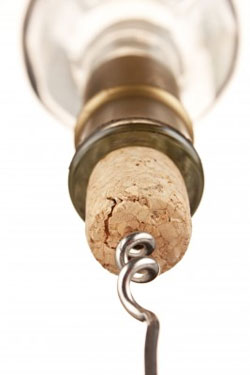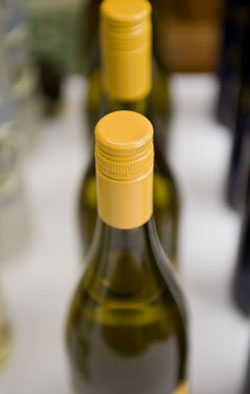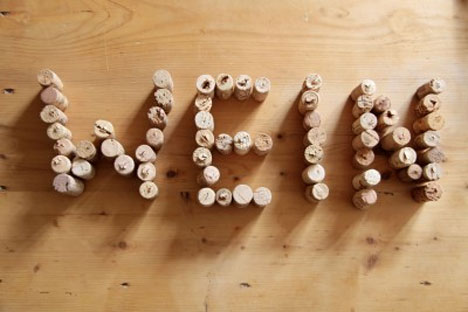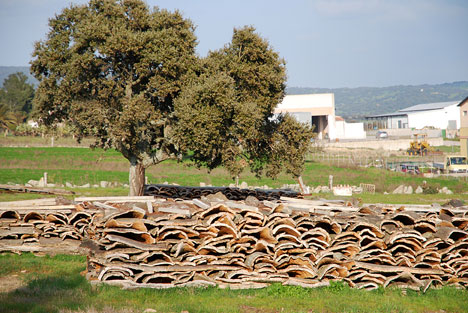"If the screw cap is better, I don't see why we shouldn't switch." So says Paul Pontallier, managing director and oenologist at Château Margaux since 1983. The top wine estate in the Médoc has been experimenting with different bottle closures for years and now not only wants to switch to organic production, but is also seriously considering a move away from natural corks.
In 2002, Pontallier had bottles of his second wine Pavillon Rouge sealed with screw caps for the first time for test purposes. At that time, he was still cautious: first, the alternatives to natural cork would have to be carefully researched. After ten years of experimenting, he now declared in February 2012 on the occasion of a wine presentation in London: "With Pavillon Rouge, the screw cap gave excellent results - in contrast to the natural cork." The Margaux boss had not even packed test bottles with plastic corks: "A disaster!"
The tasting participants were able to comprehend the test results right on the spot. The verdict was mixed for a white wine from the 2004 vintage, but for the Pavillon Rouge 2003, the panel preferred the screw-capped bottle to the corked one. "We all get frustrated with corked bottles," Pontallier said, "so a different, better closure would be most welcome."
This finding is in line with the experience of Merum editor Jobst von Volckamer, who has been dealing with the cork problem for a long time. Although the actual cork taint has decreased significantly in recent years due to efforts by the industry, wine lovers still have to reckon with a loss of around five per cent. Let's be honest: every twentieth milk carton, every twentieth beer, every twentieth fruit juice undrinkable simply because of the closure - would you accept that? With wine, however, consumers swallow this imposition - why?
The answer lies in the image: cork stands for exclusive, artisanal and expensive, screw caps, on the other hand, are associated with cheap, industrially produced mass wine. It is such prejudices that make quality-conscious winemakers, of all people, hesitate to use screw caps. And that is why it is so important when a man of Paul Pontallier's stature provocatively declares: "I am intellectually ready to change Because change begins in the mind.
It is therefore no coincidence that the screw cap has been established in the new wine world for quite some time, especially in Australia. Penfolds, for example, now uses screwcaps for all its wines with the exception of the Grange. Eight years ago, chief oenologist Peter Gago had test bottles of the 2000 vintage of the top wine fitted with screw caps. They are to be opened in 2024 at the earliest, and from then on, they are to give information about whether the capsule also allows for decades of storage. If Penfolds continues to seal wines with natural corks, it is because they respect different preferences. "Tradition-oriented markets like Asia, the USA or Europe demand cork, whereas the Australian consumer prefers the screw cap", explains Sandy Mayo, marketing director at Penfolds.
 The fact that European wine lovers are so conservative about wine closures is also due to legislation. The European Union only abolished a list of permitted closure devices with the most recent reform of the wine sector in 2009 - since then, European winegrowers have theoretically been free to choose their bottle closure as long as it is suitable for food use.
The fact that European wine lovers are so conservative about wine closures is also due to legislation. The European Union only abolished a list of permitted closure devices with the most recent reform of the wine sector in 2009 - since then, European winegrowers have theoretically been free to choose their bottle closure as long as it is suitable for food use.
But in Italy, a law from 1993 is still in force that prescribes the use of natural corks for DOCG wines as well as DOC wines with an indication of the subzone, the designation "Vigna" or "Riserva". Absurdly, however, the same law allows the use of screw caps when these same wines are bottled in small bottles of up to 0.375 litres.
Merum conducted an online survey on the subject of bottle closures at the end of April/beginning of May 2012, in which 101 DOCG and 198 DOC/IGP winemakers took part. The results are extremely interesting. Although 57.4 percent of the DOC/IGP vintners prefer natural corks to screw caps, the exact same majority is in favour of abolishing the cork mandatory. Of the DOCG vintners, 69.5 percent think natural cork is better, but nevertheless almost every second one (47.4 percent) would be in favour of abolishing the cork obligation.
If they were allowed to vote at all, the case would be clear: 70.2 per cent of DOCG and even 74 per cent of DOC/IGP winegrowers would use screw caps for their wines if they were accepted by consumers. Law and false myths, however, force them to do exactly the opposite: Only one in five DOCG and one in four DOC/IGP winemakers use screw caps or crown caps.
Even more absurd is that 28 percent of DOC/IGP winemakers use plastic corks, although nine out of ten are of the opinion that plastic is not preferable to screw caps for oenological reasons (89.1 percent); among DOCG winemakers, this contradiction is almost as great, with 25.1 percent using plastic and 88 percent actually rejecting it (see cork survey below).
What emerges indirectly from the survey is the vintners' striving for quality: if they were allowed and able, they would of course only use the best possible closure for their wines.
The fact that they still do not do so is also due in large part to economic constraints: Those who already have a bottling line for natural corks can easily adapt it to plastic stoppers, but for screw caps they have to buy a new machine. For small winegrowers and those who have to close a large part of their production with natural corks in compliance with the law, such an investment does not pay off.
 Merum therefore advocates expanding the room for manoeuvre of quality-conscious wine producers and abolishing the natural cork obligation for DOCG and DOC wines affected by it. This step would not lead to the imminent disappearance of really high-quality natural corks, but only to the gradual withdrawal of the problematic agglomerated corks from circulation.
Merum therefore advocates expanding the room for manoeuvre of quality-conscious wine producers and abolishing the natural cork obligation for DOCG and DOC wines affected by it. This step would not lead to the imminent disappearance of really high-quality natural corks, but only to the gradual withdrawal of the problematic agglomerated corks from circulation.
Competition from other closures would force the cork industry to further improve the quality of natural corks and would allow the suitability of the various closure methods to be tested in practice in the long term. At the moment, the screw cap has the best chance of success, as producers and consumers have recently started to say goodbye to plastic stoppers. So all that remains is to finally dispel some of the cork myths.
But what do you think, dear readers? Your opinion on the subject is important, even decisive for the further development of the "sealed wine"! Because without customer acceptance, no product, no matter how innovative, can be successful in the long term. We therefore invite you to take part in the Merum survey on the subject of bottle closures:
To the reader survey on bottle closures at www.merum.info
The reader survey ends on 2 July 2012 and the results will be published in Merum 4/2012.
At the end of April/beginning of May 2012, the Merum editorial team conducted an online survey among Italian winegrowers on the subject of wine closures. Winegrowers who produce DOCG wines and those who produce DOC and/or IGT wines were invited separately by mail to answer the same six questions with a yes or no. 101 DOCG and 198 DOC/IGT winemakers took part in the survey - here are the commented results.
1. Do you prefer natural cork to screw caps for wine storage?
| DOCG | DOC/IGT |
| Yes: 69.5% | Yes: 57.4% |
| No: 30,5% | No: 42.6% |
Natural cork is obviously still considered the wine closure par excellence, even among producers. But four out of ten DOC/IGT vintners who would not prefer it to the screw cap, that is a strong minority of cork sceptics. The fact that they are significantly rarer among DOCG vintners is probably also related to the legal natural cork compulsory for this wine category. Compare the results with those of question 6!
2. Do you use screw caps and/or crown caps for one or more of your wines?
| DOCG | DOC/IGT |
| Yes: 21.4% | Yes: 25.1% |
| No: 78.6% | No: 74.9% |
One in five DOCG and even one in four DOC/IGT winegrowers already use screw caps or crown corks for wines that are not affected by the natural cork obligation. This is not little in view of the legal requirements and the positive cork image (see question 1), but it would be much more if the winegrowers were allowed to decide for themselves (see question 5).

3. Do you use plastic corks for one or more of your wines?
| DOCG | DOC/IGT |
| Yes: 24.5% | Yes: 28% |
| No: 75.5% | No: 72% |
On average, slightly more than one in four winemakers also put plastic stoppers in their bottles where this is allowed. This is only slightly more than with screw caps and not a resounding success, considering that the producer does not have to buy a new corking machine for plastic corks, as is the case with screw caps.
4. From a purely oenological point of view: Is the plastic cork preferable to the screw cap?
| DOCG | DOC/IGT |
| Yes: 10.9% | Yes: 12.0% |
| No: 89,1% | No: 88.0% |
In practice, plastic seems to cause problems: In any case, nine out of ten producers see no oenological advantage for plastic corks. This explains why, after the initial euphoria, it has not really caught on.
5. Would you use screw caps if your customers accepted them?
| DOCG | DOC/IGT |
| Yes: 70.2% | Yes: 74.0% |
| No: 29.8% | No: 26,0% |
In addition to the law, it is the wine lover's image that is decisive: today, winegrowers do not use screw caps merely because they are forbidden for certain wines, but primarily because they are rejected by buyers. If things were different, seven out of ten producers would use screw caps - even for DOCG wines!
6. In your opinion, would it be appropriate to abolish the natural cork obligation for DOCG wines?
| DOCG | DOC/IGT |
| Yes: 47.4% | Yes: 57.4% |
| No: 52,6% | No: 42.6% |
The fear of image loss due to screw caps deters a slight majority of DOCG winegrowers from doing without the natural cork requirement. Of course, this also helps to distinguish DOCG wines from simple DOC wines. This probably also explains why a majority of DOC/IGT winegrowers, on the other hand, want to abolish the law.
 |
| Cork bark stacked to dry in Gallura% Sardinia (Photo: Andreas März% Merum) |
1. If cork disappears, so do the cork oak forests or they are no longer sustainably managed.
The opposite is true: for high quality, the cork bark has to grow for at least nine years. But because of the great demand for cheap bottle cork, the bark is often harvested earlier. This is not sustainable but intensive production, which stresses the trees and threatens their survival more in the long run. In Portugal and Spain, 120,000 hectares of such highly productive cork oak plantations have been newly established in recent years - at the expense of the near-natural cork oak forests.
A reduction in demand would reduce the economic pressure on these forests, promote their sustainable management and lead to better cork qualities in the long term. These would continue to be used for bottle corks, but also as insulation material, for flooring, shoes or pinboards, etc.
2. If we give up cork, 100,000 people will lose their jobs.
The main problem of the cork industry is the lack of diversification: it generates about 13 billion bottle corks worldwide, which is two thirds of the total turnover (estimate: Cork Quality Council, 2000). A bottle cork thus costs less than eight cents on average - corks of the best quality are ten times as expensive. With a quality offensive, the added value of bottle corks could be increased considerably. Secondly, lower cork qualities could be better used for other products, for example for thermal insulation in the context of a Europe-wide campaign for energy-efficient renovation of residential buildings. Higher added value and diversification would thirdly stimulate employment in the cork sector. In Portugal, which produces 54 per cent of the world's cork, this sector employs just 28,000 of almost five million workers (0.56 per cent, as of 2002).
3. Thanks to the latest techniques, TCA is becoming more and more manageable.
That's right! Parts of the cork industry have recognised the signs of the times and invested in better cork quality and process technology, the actual cork taint has indeed decreased. Nobody is asking for good quality natural cork to be banned as a wine stopper. But inferior qualities should better insulate houses than seal quality wines. That's where the screw cap comes in as a viable alternative.
4. The wine must breathe so that it matures better.
Tests at Penfolds, Château Margaux or Cantina di Monteforte show that bottles with screw caps are more uniform among themselves, apparently ripen slower and the wine thus stays fresh longer. There is also sufficient evidence that the amount of oxygen dissolved in the wine or remaining in the neck of the bottle after bottling ensures the desired maturation of the wine, while the air penetrating through the cork pores is responsible for the rapid ageing of the bottle's contents. This is why producers do not fear that the wine will go bad even after decades of storage, but worry about the long-term tightness of the screw caps themselves. This therefore still requires long-term tests - but seriously, natural corks can also leak after years of horizontal storage, which is why Penfolds, for example, runs a cork clinic: Grange buyers can have their bottles checked and re-corked after 15 years. Why shouldn't that also be possible with screw caps?
5. Opening the bottle is a sensual ritual. Don't take that away from me.
Apart from the "pop": Does the sensuality consist in picking out stuck or crumbling natural corks? Or do we perhaps even need natural cork because otherwise we lack the thrill (does it cork or not)? The really sensual thing is the enjoyment of the wine itself! And thanks to the screw cap, this lasts for a whole bottle. Or even two, because the next one is just as long.
To the magazine article "The most common closures
To the magazine article "Winemakers' and associations' opinions on closures"
To the interview with Prof. Dr. Rainer Jung, Geisenheim Research Institute